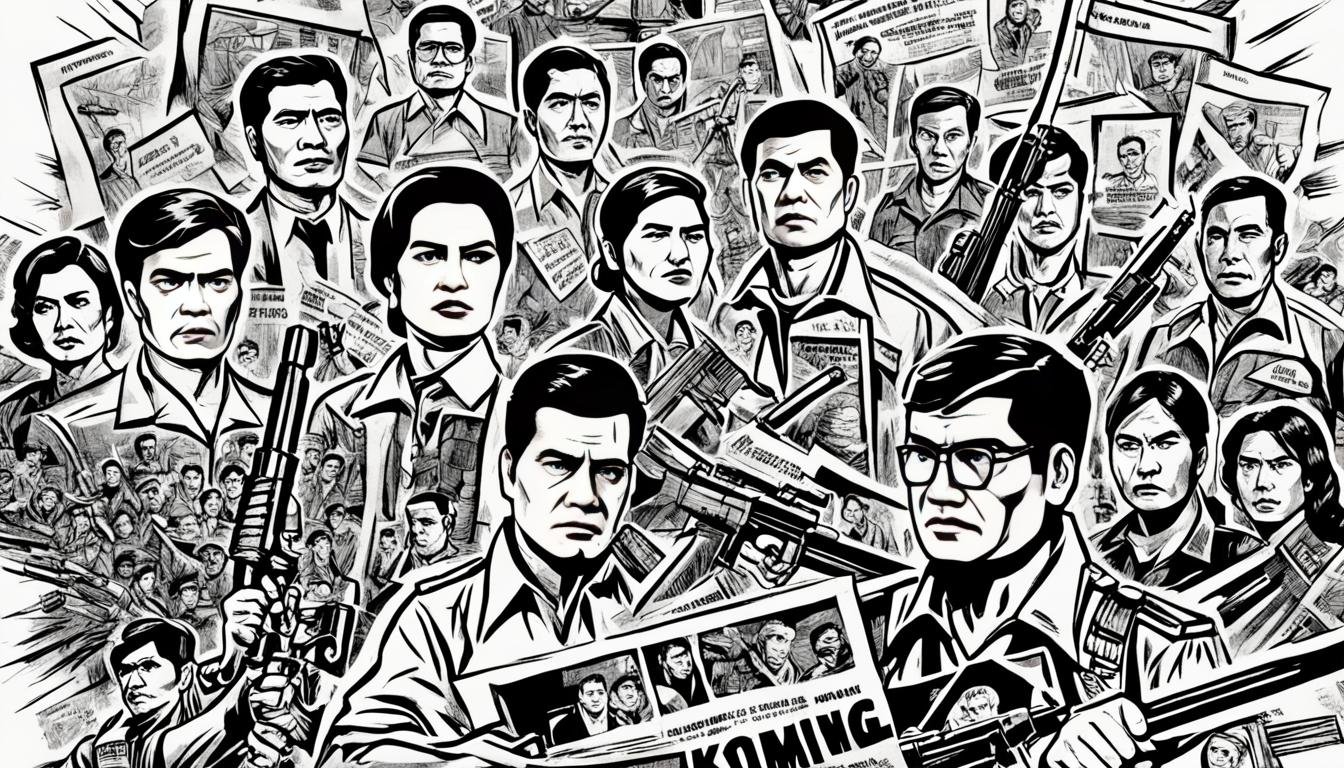Did you know the Partido Kommunista ng Pilipinas (PKP) played a big role in Philippines’ history? They helped shape political talk and opposition during the Marcos era. The PKP’s work really changed how politics was viewed.
Key Takeaways
- The Partido Kommunista ng Pilipinas (PKP) had a significant impact on political discourse and resistance during the Marcos era.
- The PKP employed various strategies and tactics to mobilize opposition against the Marcos regime, including organizing protests, strikes, and other forms of resistance.
- Despite state suppression, the PKP managed to continue its activities through underground movements and alliances with other opposition groups.
- The PKP played a crucial role in documenting and exposing human rights abuses committed by the Marcos regime.
- The propaganda wars between the Marcos regime and the PKP shaped the battle for public opinion during this period.
Next, we’ll look at how the PKP grew and avoided getting stopped. We’ll also see how they reached lots of people and their lasting impact after Marcos. Explore with us the PKP’s notable history during the Marcos era.
The Partido Kommunista ng Pilipinas (PKP) became key during Martial Law under Ferdinand Marcos. It had a big impact on Philippine history. We’ll talk about how the PKP grew and its early fights against Marcos.
Please focus on the PKP’s rise during Martial Law. We will learn about its background and main goals. The PKP aimed to bring socialism to the Philippines. It wanted to change society through armed revolution. Their goal was to create a system that cared for the working class first.
The PKP believed strongly in using armed revolution. They thought this could lead to achieving socialism. This was unlike many other groups against Marcos. So, this focus on armed struggle was a defining feature of the PKP’s fight.
Initial Resistance and Tactics against the Marcos Regime
The PKP used many strategies to fight Marcos. They helped organize protests, strikes, and more. This brought together different people to oppose the dictatorship.
The PKP’s work was vital in sparking action against Marcos. They reached out to workers, peasants, students, and more. This united a powerful front against Marcos.
With their clever planning and organization, the PKP helped lead the fight against Marcos.
Subjugation and Survival: PKP’s Underground Movement
To avoid being caught during the Marcos era, the Partido Kommunista ng Pilipinas (PKP) went underground. They used many strategies to stay safe and keep working despite the hard times.
Strategies to Evade Suppression
The PKP set up a complex system of secret groups and hidden cells. This way, they protected their people and missions from being found out by the government. They kept everything secret and safe to not get caught. This allowed the PKP to keep their important work going without the Marcos regime knowing.
Getting new members and talking secretly was crucial for the PKP. They carefully chose who they let into their group to make sure they were on the same page. They used secret codes, hid messages, and had special spots to meet. This made it possible for the PKP to share info and work together without anyone knowing.
The PKP also got help from friends in the city. These supporters offered places to stay, things they needed, and important information. This help made it possible for the PKP to stay hidden and keep doing their work against the state.
Creating Alliances and Building Solidarity
Valuing teamwork, the PKP teamed up with other groups against the Marcos government. They made strong friends with worker unions, student groups, and those who fought for human rights. This wide group helped boost their shared battle against the bad laws of Marcos.
Joining forces with different groups made the PKP stronger and more united. Together, they spoke louder, pushed harder, and stood up against Marcos’ wrongdoings. Their unity helped highlight what was going on and fight against the government’s bad actions.
What’s more, the PKP didn’t just aim for local support. They looked for help from others around the world, connecting with similar groups and movements globally. This international union aided the PKP by making their fight more known. It also added to the legitimacy of their resistance against the Marcos government.
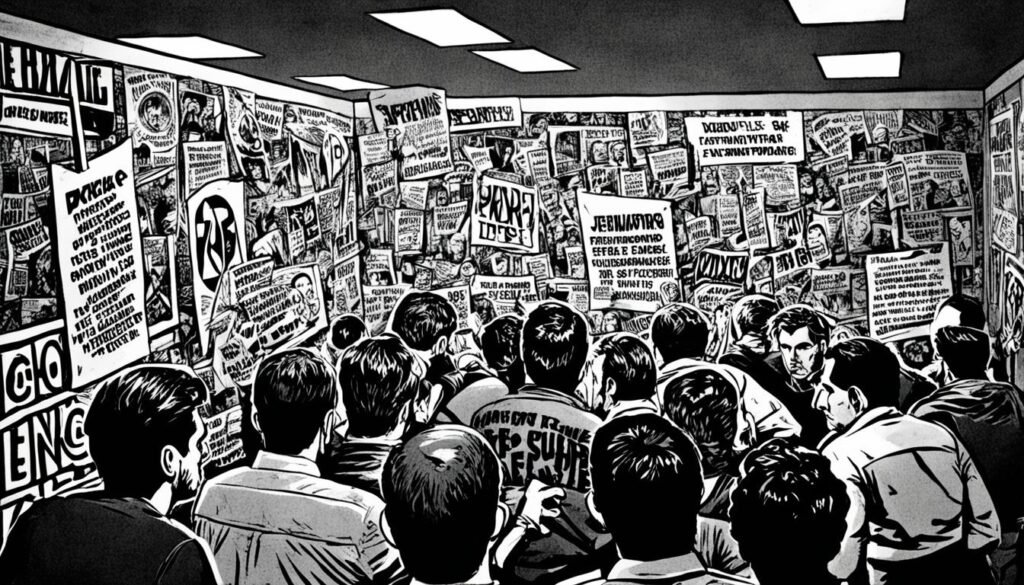
Human Rights Abuses and the PKP’s Defiance
This part talks about the Marcos regime’s human rights abuses. It also covers how the Partido Kommunista ng Pilipinas (PKP) fought back. The Marcos government did many wrong things, like killings and torture. The PKP helped by showing the world these crimes against the people.
The PKP wasn’t scared of the Marcos regime. They fought for what was right, especially for those who were treated unfairly. They put their lives at risk to help the victims of these crimes.
The PKP didn’t just talk about these problems; they also did something to help. They worked to make sure the bad people faced justice. They organized protests, got help from other countries, and used the law to fight for the victims and their families.
The PKP’s courage in the face of serious human rights issues shows their dedication to justice, democracy, and protecting people’s rights.
The PKP helped those who were often forgotten in society. They fought for the rights of workers, poor farmers, native peoples, and others who were not treated fairly.
Their fight against human rights abuses is still remembered today. Their brave deeds motivate others to stand up against wrongs, fight for the truth, and push for justice. They remind us of the unbeatable Filipino spirit in the fight for fairness and freedom.
*Image depicts the PKP’s defiance and commitment to justice during the Marcos era.
Read more about the PKP’s defiance against human rights abuses.
Propaganda Wars and the Battle for Public Opinion
The Marcos regime and the Partido Kommunista ng Pilipinas (PKP) fought hard for public support. During Ferdinand Marcos’ rule, his government used a strong propaganda machine. This machine aimed to control what people believed, using state-run media, censorship, and false stories. They tried to stop people from speaking out, weaken opposing groups, and stay in power.
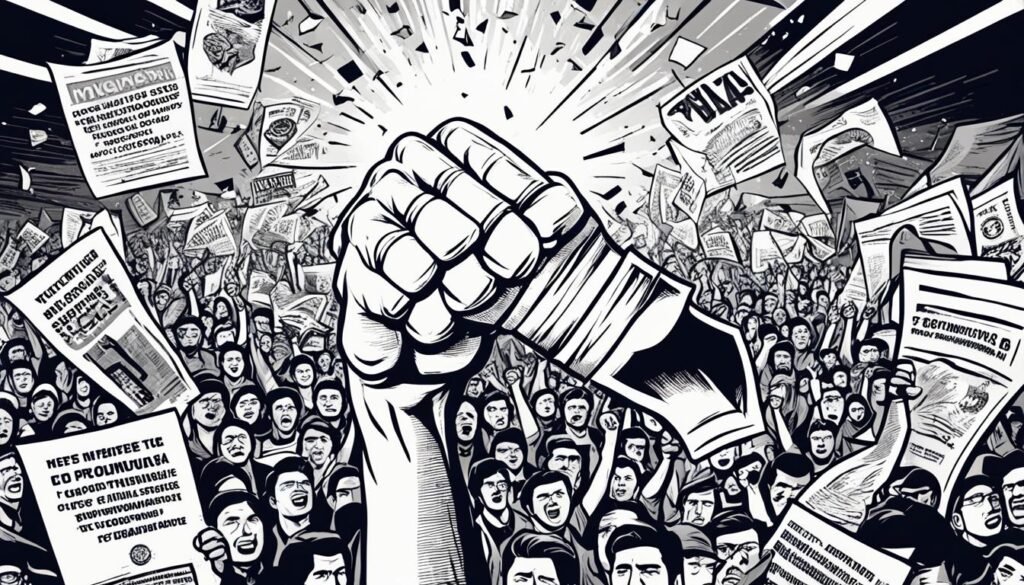
Marcos’ propaganda painted the government as a hero and the PKP as a danger. They spread lies, scared people, and made them doubt the PKP.
PKP fought back by telling the truth. They used hidden newspapers, talked to people directly, and joined with other groups. PKP showed that they were fighting for the good of the Filipino people, not Marcos.
The Marcos Propaganda Machine vs. PKP’s Counter-narratives
Marcos controlled what the media said and hid the truth. They did this by using state-run media, stopping free speech, and spreading fake news.
- Media manipulation: They used media to say good things about the government and stop bad news.
- Censorship: Marcos banned news and stories that were against him to control what people knew.
- Disinformation campaigns: He spread lies to make people doubt the opposition and not trust them.
PKP, on the other hand, used many ways to fight back:
- Underground publications: They made secret newspapers to tell people what was really happening and to challenge Marcos.
- Grassroots communication networks: They talked directly to the people to share their message widely.
- Alliance-building: PKP joined with other groups to be louder against Marcos, weakening his hold on the narrative.
International Outreach for Support and Recognition
PKP also looked beyond the Philippines to fight Marcos’ propaganda. They connected with other like-minded groups worldwide. Their goal was to find support and share the truth about the human rights issues in the Philippines.
PKP tried to get the world to stand with them against Marcos. They went to meetings, talked to governments that were on their side, and worked with human rights organizations to count the abuses in the Philippines.
By being part of this global network, PKP wanted to turn the tide against the Marcos regime’s lies. They fought for the truth, justice, and democracy across the Philippines.
Learn more about the impact of propaganda wars and international outreach in the Philippines.
The Partido Kommunista ng Pilipinas’s Influence on The Masses
During the Marcos era, the Partido Kommunista ng Pilipinas (PKP) had a big impact. They helped the urban poor and peasants in the Philippines. The party worked hard to address their problems and fight for their rights.
Mobilizing the Urban Poor and Peasants
The PKP saw the struggles of the urban poor and peasants. They faced landlessness, poverty, and exploitation. The party held rallies, protests, and campaigns to make their problems known.
Working with labor unions and community groups, the PKP fought for better conditions and wages. They aimed to improve life for workers and their families. By coming together, these voices became stronger in seeking reforms.
The PKP also pushed for agrarian reform and gave land back to peasants. They set up associations and cooperatives. These helped peasants farm better and improved life in rural areas.
Educational Programs and Political Indoctrination
The PKP worked hard to educate and influence its supporters. They taught about Marxist-Leninist ideas and political awareness. The party’s educational efforts were at the heart of their influence.
They had classes, circles, and workshops to teach their members. This deepened their understanding and prepared them to work effectively. The PKP made sure everyone had the knowledge to make a difference.
They also used posters, newsletters, and pamphlets to spread their message. These materials were key in connecting with people. They influenced how the public thought about important issues.
The PKP made sure their members and supporters worked together strongly. Their teachings created a shared belief and mission. This helped the party in its goals for social fairness and equality.
The PKP’s work with the urban poor and peasants during Marcos’s time was very important. Their efforts to organize and educate people had a lasting impact. It significantly changed the lives of many in the Philippines.
For more about the PKP’s work, click here.
State Policies and Legislation: Impact on Partido Kommunista ng Pilipinas’s Activities
During the Marcos era, the Partido Kommunista ng Pilipinas (PKP) faced many challenges due to state policies. The government put into effect anti-subversion laws. These laws aimed to stop communist activities. They also made it hard for the PKP to operate without interference.
The PKP’s work was greatly affected by these laws. The government tried to destroy the party. They made it illegal to support or be part of the PKP. This led to people being arrested, questioned, and jailed.
Counterinsurgency efforts also hurt the PKP’s activities. The government sent soldiers to fight against communist groups. This included the PKP. The fighting and heavier security made it tough for the PKP to do its work.
The PKP found ways to keep working even under these tough conditions. They started operating in secret. They created hidden groups and networks to stay hidden from the government. With these secret efforts, the PKP kept on protesting and fighting against the Marcos government.
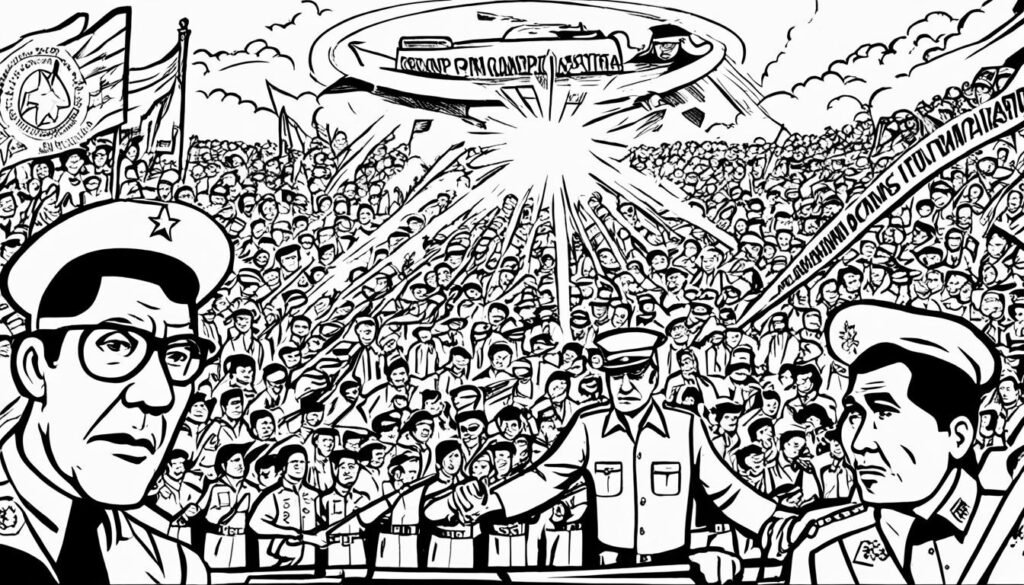
Despite state actions, the PKP kept pushing for change. Their strong will showed their deep belief in their ideas. They fought for a fairer society even against great odds.
Looking back at how state laws affected the PKP helps us see their struggles. It shows us the hard work they did to keep fighting and organizing. This historical knowledge gives us insight into the PKP’s lasting influence on the country.
For further details on how state policies impacted the PKP, check out this government document.
The Economic Front: PKP’s Approach to Labor and Agriculture
The Partido Kommunista ng Pilipinas (PKP) sees labor and agriculture as vital for its socialist goals. They aim to boost workers’ rights and push for fair agrarian reform. This strengthens the goal of a more equal sharing of resources.
Infiltrating Trade Unions and the Rural Sector
The PKP values the strength of labor groups for workers’ protection. It joins trade unions in all sectors to build company among workers. This helps them push for better pay, safer work, and more social benefits.
The PKP’s reach isn’t just in cities; it also extends to rural areas. They know how important farmers are in the fight for a better system. The party supports them by promoting the sharing of land, ensuring they have what they need, and encouraging ways that don’t harm the land.
Land Reform and Labor Rights Advocacy
The party is a key player in wanting big changes in farming areas. They strive for land to be more fairly spread out among farmers. This would get rid of old, unfair ways that keep people poor and powerless.
They also lead in standing up for those who work in many jobs. They work to put friendly work laws in place, stop bad work deals, and educate workers. This builds their power to act together for better working conditions.
The PKP’s focus on both labor and agriculture targets social fairness. By getting into unions, supporting land reform, and fighting for good work laws, they make big efforts. This has made workers and farmers in the Philippines more aware of their rights and more able to stand up for them.
Red-tagging and the Fight for Political Legitimacy
This section is all about red-tagging, a method used to discredit certain people or groups. They are called communists or terrorists to make them seem less trustworthy. The text looks into how the PKP and its members are affected by red-tagging.
Red-tagging has grown into a major divisive strategy. It’s often used by those in power to push back against critics. They accuse people and groups of being threats to the country. They may link them to violence or armed groups.
This approach makes it hard for anyone to speak out for justice or rights. If you’re labeled a “communist” or “terrorist,” you face serious problems. This includes being watched, bothered, or even attacked.
Being red-tagged makes it hard for the PKP members to work effectively. They’re always in fear of being targeted. This fear slows down their movements and makes it hard to gather support for their work.
Red-tagging also changes how people see the PKP and its members. It often makes others think they’re linked to dangerous activities. This push people and groups away, cutting their chances to find support for their ideas.
The struggle against red-tagging is tough, but the PKP keeps going. They work hard to show they stand for social and economic changes. These changes aim to fight unfairness and wrongs in the Philippines.
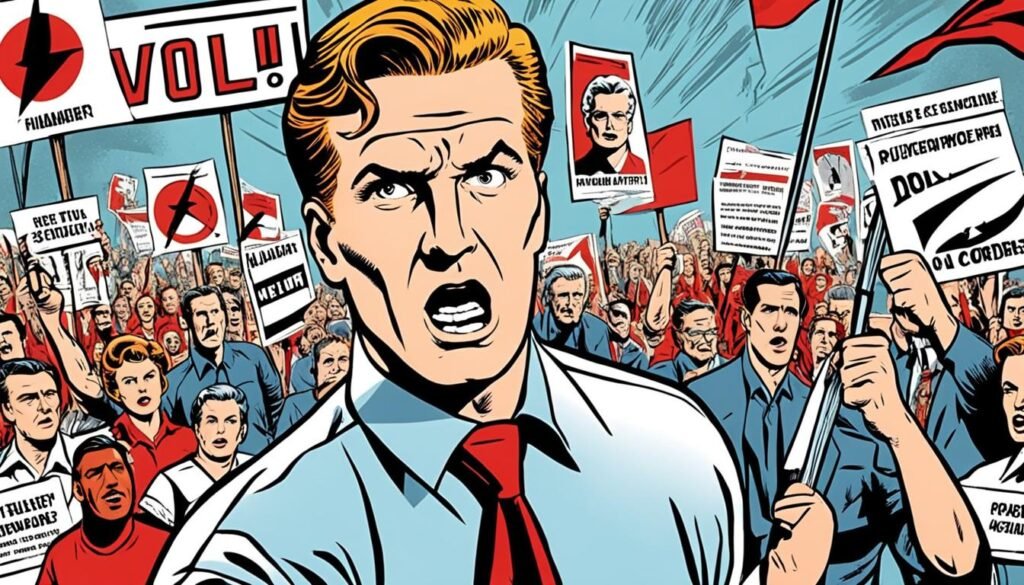
According to a report by Crisis Group, red-tagging is a big issue in the Philippines. It leads to fear and blocks positive change. The report stresses the importance of dealing with this problem. By doing so, it’s possible to protect human rights and grow a more open and democratic community.
Legacy of the Partido Kommunista ng Pilipinas in Post-Marcos Philippines
Ongoing Influence in Filipino Politics
The Partido Kommunista ng Pilipinas (PKP) still affects Filipino politics after Marcos. It has survived challenges and repression. The PKP’s ideas and actions keep affecting political talks, voting, and policies.
The PKP follows Marxism-Leninism and fights through armed revolution. It has made others in the Philippines think about the hard lives of poor and forgotten people. This has pushed for big changes and a fairer society for all.
The PKP is big on getting people from the ground up involved. It wants to help the poor in cities and the countryside. Its pushes for their rights and better lives still impact how politics goes in the Philippines.
Lessons Learned and the Path Forward
The PKP’s past is full of useful lessons. It shows how bringing all kinds of people together can beat bad governments. This involves not just political groups but also workers, students, and those who fight for human rights. They should join hands to win.
It’s key for these groups to work as a big team and support each other. This way, they can share what they know and make smarter plans to fight on.
The PKP’s stories tell us just how crucial politics and voting are. Being a part of these can help these groups change the system for the better. This way, the weak can have a louder voice.
To make the Philippines fair for everyone, these groups must face many tough issues. These include being attacked politically, being accused of bad things, and lies about them. They can learn from the PKP’s and others’ stories. This can show them ways to go forward and make things better for Filipinos.
Conclusion
Diving deep into the Partido Kommunista ng Pilipinas (PKP) during the Marcos era revealed a lot. The party made a big difference in political talk and resistance to Marcos. They used their influence for change.
The PKP started early in fighting Marcos. They organized protests and strikes to join people together against the regime. This helped in the overall pushback against Marcos.
Despite tough times, the PKP kept fighting. They hid their activities and grew their support. They made friends with different groups, making their fight against Marcos stronger.
The PKP also fought hard for human rights. They stood up for those being treated unfairly. Even with Marcos’s brutal tactics, the PKP never gave up on justice.
In the battle about who’s right, the PKP took on Marcos’s lies. The PKP worked on telling the true story, both at home and abroad. They made friends with other similar groups worldwide, spreading the word about the Philippines.
The PKP helped the urban poor and farmers feel heard and supported. They fought for their rights and taught them about politics. This made people more aware and strong.
The laws against the PKP did hurt its work. Things that Marcos made to stop them, like banning groups, slowed them down.
Summing it up, knowing the PKP’s story from Marcos’s time is key. It teaches us about old and new politicking in the Philippines. What the PKP did and fought for can guide today’s progressive movements, showing them the way to a fairer nation.
To explore further, you can refer to the full report on the PKP’s impact during the Marcos era here.
FAQ
What is the Partido Kommunista ng Pilipinas (PKP)?
The Partido Kommunista ng Pilipinas (PKP) is a communist party in the Philippines. It aims to bring socialism through a revolution.
What was the PKP’s role during the Marcos era?
During Marcos’ time, the PKP fought against his government. They worked to protect people’s rights and spread socialist ideas.
What were the foundational goals of the PKP?
The PKP aimed for socialism by using armed struggle. Their plan was guided by Marxist-Leninist thoughts.
How did the PKP resist the Marcos regime?
They organized protests, strikes, and other actions. Their efforts gathered various society groups to fight against Marcos.
How did the PKP survive underground during the Marcos era?
The PKP managed to avoid government actions by hiding their activities. They used secret groups and smart ways to recruit and talk secretly.
Did the PKP collaborate with other opposition groups?
Yes, the PKP worked with other groups against Marcos. This included unions, students, and those fighting for human rights.
How did the PKP defy human rights abuses committed by the Marcos regime?
They highlighted and fought against human rights violations. Their goal was to protect those who were suffering.
What were the propaganda wars between the Marcos regime and the PKP?
The Marcos government tried to control information to promote their views. The PKP fought back by telling their own story.
Did the PKP have international support?
Yes, the PKP reached out globally. They connected with other communist groups and movements everywhere.
How did the PKP influence the urban poor and peasants?
They helped organize and advocate for those in poverty and rural areas. The PKP wanted better rights and life for these groups.
How did state policies and legislation affect the PKP’s activities?
Government laws and activities like anti-rebellion laws made it harder for the PKP to work. It limited their actions.
What was the PKP’s approach to labor and agriculture?
The PKP supported worker unions and farm reforms. They wanted fair rights and better sharing of the country’s wealth.
How has red-tagging affected the PKP?
Red-tagging has hurt the PKP’s standing. It’s made it harder for them to be seen as trustworthy.
What is the legacy of the PKP in post-Marcos Philippines?
The PKP still influences politics today. Its history guides new movements striving for a better Philippines.
What is the significance of understanding the PKP’s impact in the Marcos era?
Knowing the PKP’s effect back then helps us see today’s politics clearer. It connects past struggles with what’s happening now.
Source Links
- https://scholarworks.calstate.edu/downloads/2b88qj75p
- https://www.quora.com/After-thoroughly-examining-the-facts-surrounding-martial-law-what-is-your-stance-on-the-matter-Do-you-believe-Ferdinand-Marcos-Sr-s-actions-were-wrong-or-do-you-hold-a-different-perspective
- https://apps.dtic.mil/sti/tr/pdf/ADA227344.pdf

